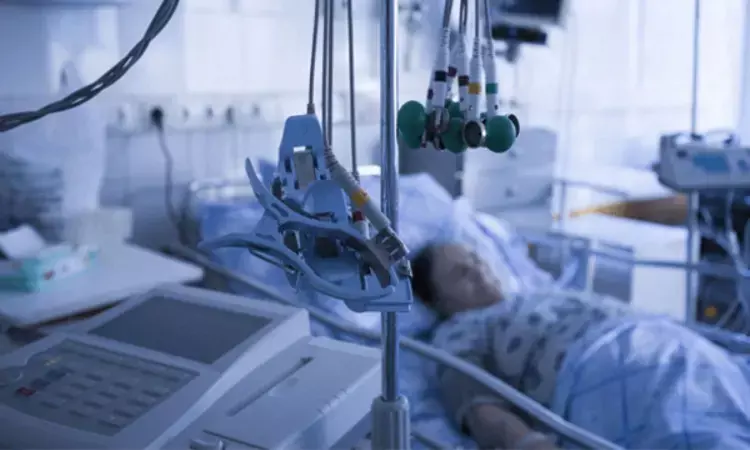- Home
- Medical news & Guidelines
- Anesthesiology
- Cardiology and CTVS
- Critical Care
- Dentistry
- Dermatology
- Diabetes and Endocrinology
- ENT
- Gastroenterology
- Medicine
- Nephrology
- Neurology
- Obstretics-Gynaecology
- Oncology
- Ophthalmology
- Orthopaedics
- Pediatrics-Neonatology
- Psychiatry
- Pulmonology
- Radiology
- Surgery
- Urology
- Laboratory Medicine
- Diet
- Nursing
- Paramedical
- Physiotherapy
- Health news
- Fact Check
- Bone Health Fact Check
- Brain Health Fact Check
- Cancer Related Fact Check
- Child Care Fact Check
- Dental and oral health fact check
- Diabetes and metabolic health fact check
- Diet and Nutrition Fact Check
- Eye and ENT Care Fact Check
- Fitness fact check
- Gut health fact check
- Heart health fact check
- Kidney health fact check
- Medical education fact check
- Men's health fact check
- Respiratory fact check
- Skin and hair care fact check
- Vaccine and Immunization fact check
- Women's health fact check
- AYUSH
- State News
- Andaman and Nicobar Islands
- Andhra Pradesh
- Arunachal Pradesh
- Assam
- Bihar
- Chandigarh
- Chattisgarh
- Dadra and Nagar Haveli
- Daman and Diu
- Delhi
- Goa
- Gujarat
- Haryana
- Himachal Pradesh
- Jammu & Kashmir
- Jharkhand
- Karnataka
- Kerala
- Ladakh
- Lakshadweep
- Madhya Pradesh
- Maharashtra
- Manipur
- Meghalaya
- Mizoram
- Nagaland
- Odisha
- Puducherry
- Punjab
- Rajasthan
- Sikkim
- Tamil Nadu
- Telangana
- Tripura
- Uttar Pradesh
- Uttrakhand
- West Bengal
- Medical Education
- Industry
Microaxial Flow Pump Lowers Medication Needs and Improves Stability in Cardiogenic Shock Patients: DanGer Shock Substudy

Denmark: In a pivotal sub-study of the DanGer Shock randomized clinical trial, researchers have unveiled significant findings regarding the use of Microaxial Flow Pumps (MAFP) in patients suffering from infarct-related cardiogenic shock (CS) due to ST-elevation myocardial infarction (STEMI).
The study, published in JAMA Cardiology, revealed that using MAFP decreases the need for vasopressors and inotropic medications while ensuring hemodynamic stability and promoting quicker normalization of lactate levels in this critically ill patient population.
Cardiogenic shock, characterized by the heart's inability to pump sufficient blood, often results from a severe heart attack and poses a high risk of mortality. Traditional management strategies include aggressive fluid resuscitation and the use of vasopressors and inotropic agents to support heart function. However, these methods can be limited and often result in variable patient responses.
Mechanical circulatory support using an MAFP has demonstrated improved survival rates in patients experiencing cardiogenic shock due to STEMI-CS. Understanding its effects on hemodynamic stability over time is essential for optimizing treatment strategies for these patients. Considering this, Nanna Louise Junker Udesen, Department of Cardiology, Odense University Hospital, Odense, Denmark, and colleagues assessed whether an MAFP decreases the reliance on pharmacological circulatory support while maintaining hemodynamic stability compared to standard care in patients with STEMI-related cardiogenic shock.
For this purpose, the researchers conducted a substudy of the Danish-German (DanGer) Shock trial, an international, multicenter, open-label randomized clinical trial involving patients from 14 heart centers across Denmark, Germany, and the UK. Participants included those with STEMI, systolic blood pressure below 100 mm Hg or receiving vasopressor treatment, left ventricular ejection fraction under 45%, and arterial lactate levels exceeding 2.5 mmol/L. After excluding patients who died in the catheterization lab or upon ICU admission, the remaining participants had serial hemodynamic, arterial lactate, and vasoactive drug use recordings. Those in comas post-cardiac arrest and those with mechanical complications or right ventricular failure were also excluded.
Patients received either an MAFP combined with standard care or standard care alone. The main outcomes assessed included hemodynamic status (heart rate and blood pressure), metabolic status (arterial lactate concentration), and vasoactive-inotropic score (VIS). Clinical events monitored during the first 72 hours included overall mortality, escalation of mechanical circulatory support, and discharge alive from the ICU.
The following were the key findings of the study:
- Among the 355 enrolled patients, 324 underwent ICU treatment, with 52% in the MAFP group and 48% in the standard care group.
- The mean age of patients was 68 years, with 80% being male.
- Baseline characteristics were similar between the two groups.
- No significant difference in heart rate was observed between groups.
- Mean arterial pressure exceeded the treatment target of 65 mm Hg in both groups, achieved with a lower VIS in the MAFP group.
- At randomization, no difference in arterial lactate levels was found; however, upon ICU arrival, the MAFP group had significantly lower lactate levels than the standard-care group (mean difference of 1.3 mmol/L).
- This difference in lactate levels persisted throughout the first 24 hours.
- The MAFP group achieved lactate normalization (<2 mmol/L) 12 hours earlier than the standard care group.
The findings from the substudy of the DanGer Shock randomized clinical trial indicate that the use of a Microaxial Flow Pump (MAFP) effectively reduced the reliance on vasopressors and inotropes, all while maintaining hemodynamic stability and facilitating quicker normalization of lactate levels.
"These results highlight the device's capability to support circulation with a reduced need for pharmacological intervention," the researchers concluded.
Reference:
Udesen NLJ, Beske RP, Hassager C, et al. Microaxial Flow Pump Hemodynamic and Metabolic Effects in Infarct-Related Cardiogenic Shock: A Substudy of the DanGer Shock Randomized Clinical Trial. JAMA Cardiol. Published online October 27, 2024. doi:10.1001/jamacardio.2024.4197
Dr Kamal Kant Kohli-MBBS, DTCD- a chest specialist with more than 30 years of practice and a flair for writing clinical articles, Dr Kamal Kant Kohli joined Medical Dialogues as a Chief Editor of Medical News. Besides writing articles, as an editor, he proofreads and verifies all the medical content published on Medical Dialogues including those coming from journals, studies,medical conferences,guidelines etc. Email: drkohli@medicaldialogues.in. Contact no. 011-43720751


